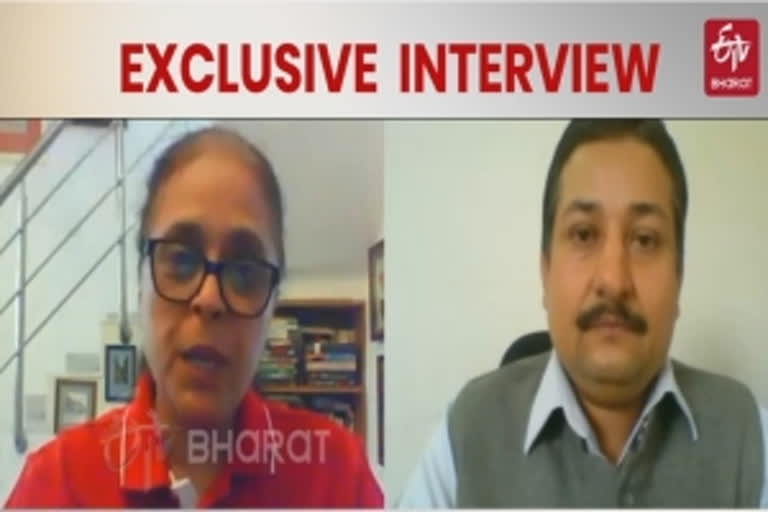New Delhi: Save the Children, a UK based charity that works for the welfare of children, has warned about the learning crisis post-COVID-19.
In its report – Save Our Education – the charity says COVID-19 has disrupted the education of 1.6 billion students in the world, which is 91% of the total students. ]
The study also says that a large number of these students who will be out of the formal education system due to the COVID-19 will not come back to the classes.
ETV Bharat’s Krishnanand Tripathi spoke to Kamal Gaur, Deputy Director of Education of Save the Children India, about the situation in India. Excerpts:
Q. It’s a global study. What will be the impact of COVID on education in India and the world?
Ans: UNESCO is saying 322 million students, from pre-primary to tertiary level, are getting impacted, or their education is being disrupted due to the coronavirus pandemic. They may be getting education by online medium but you don't know how many of them are actually learning.
If children are out of school, they are not learning whether it is ASER (Annual Status of Education Report) or Government of India's NAS report (National Achievement Survey) which talks that children are not learning.
When children were already not learning and now education is being disrupted, it is happening across the globe but in India, the education of 320 million children is getting disrupted. You can very well imagine the impact. Imagine the impact of it on children who are yet to enter the school.
Imagine the impact of this disruption on those children who are on the move with their parents, the children of migrant labourers, imagine about girls.
Q. This 20% drop out rate is applicable to India or to the world as a whole?
Ans: This is an average dropout rate of children from schools after any emergency. There is no estimate as of now, there is no research, which is being done about how many children will really get impacted because we are yet to open our schools and Anganwadi centres.
We don't know where are street children. Suddenly everybody just disappeared. We don't know what is happening to their education.
Q. A large number of middle-class children in urban centres shifted to online education, is it working?
Ans: It never happened to children. Children were never used to learning through distance mode. They are getting adjusted and know about it, it is a different issue. There are teachers who are not prepared to deliver lessons online.
The environment is such that children are under a lot of pressure. Most of the time we associate children with open spaces, playing and learning but when they are confined to their small rooms without their friends, without their teachers then it is not at all conducive. They can't ask questions, it is not the two-way kind of learning.
Q. What is your assessment, whether these four months have been wasted?
Ans: It is very difficult to say that no learning is taking place because there is no assessment or evaluation but definitely learning is disrupted.
Q. Online education also highlights the digital divide, what is the status of education in rural India?
Ans: We need to look at the alternative modes, no-cost, and low-cost basis of imparting education. Save the Children India is talking about mobile libraries, community radio for learning.
We have plan small activities for parents, which in turn, they can do with their children.
So learning is only one aspect there are so many other aspects missing in their lives at this point of time. So learning continuity is a major challenge.
Q: What is happening to mid-day meal programmes?
Ans: If you look at Anganwadi workers, they have been distributing food to children at home. This is what we have seen wherever we have worked with them. That effort is happening, but it is not a cooked meal.
Q: What are your views on conducting exams during COVID?
Ans: We are talking about the safe return of children to schools and examination centres. If we can provide that safety and that hygiene then we should think about it. I don't know how social distancing norms will be met. It's not easy. It's extremely difficult.
It's not only about the examination, it's about the stress and pressure that a child is undergoing through, even teachers. I think unless the situation is safe for children in those centres that should be avoided.
Q: Whether we should open our schools or not?
Ans: At Save the Children we are promoting the safe return of children to school. Until and unless the situation is safe and constantly managed later, we should not send back children to education centres.
Our schools are also utilized as isolation centres, so we need to sanitize them. There is a lot of preparatory work that needs to be done before opening the schools.
Q: What kind of money will be required to revive the education sector post-COVID?
Ans: A recent UNESCO report says that there will be a 12 per cent decline in funding. So we were already in a bad situation, COVID is bringing us to worse. If you look at the load of work, which is required to be done, it’s huge. I understand that investment in health and livelihood is very important but investment in education is also important to avoid that learning crisis.
Also Read: Exclusive: Myths and facts about nepotism in Bollywood



